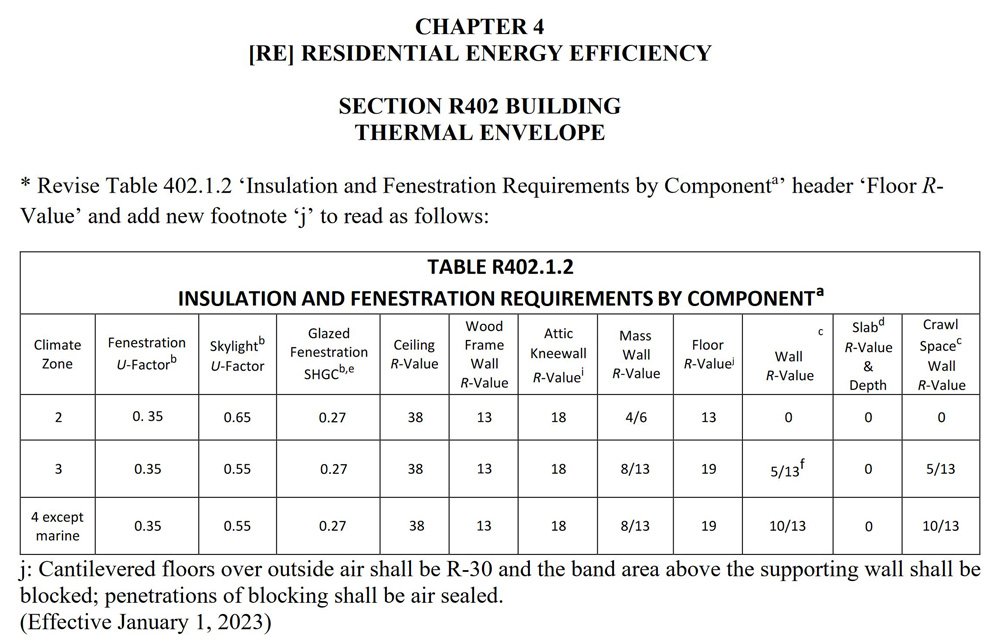Georgia’s New 2023 Building Code Amendments
Georgia has adopted new amendments to two of its building codes. The amendments take effect on January 1st, 2023.
Georgia’s building codes are adopted through the Georgia Department of Community Affairs (DCA) – Georgia’s housing agency. The DCA maintains a list of mandatory and permissive building codes on the web page of the Construction Codes division.
The following is a list of mandatory building codes from the page linked in the previous paragraph:
The DCA has published a list of the new amendments that take effect on January 1st, 2023. They include amendments to the residential energy code and the plumbing code. Here are highlights of the amendments:
Energy Code
There are three changes to the mandatory provisions of the residential energy code. They are all related and deal with projections through the exterior of a building. The image below shows a projection like the one addressed in the new provisions.
The new language requires the floor of cantilevered/projecting spaces to be insulated and air sealed. These projections often have poor air sealing so they can be a significant source of air leaks.
The insulation required at the floor is R-30. As you can see in the insulation values shown in the table below, that’s significantly more than the R-19 required for floors. That’s because these cantilevers are exposed to outside air rather than more moderate conditions in basements or crawlspaces.
The new language is added as a footnote to Table R402.1.2. See the new footnote J in the table below:
Table R402.1.2 above lists the required insulation values for components by climate zone. If this isn’t familiar, you should consider taking our building science and energy code courses offered in the first half of 2023. We’ll open them for registration in Feburary - you can join our learning community below to be notified via email.
The residential energy code provisions also include a table for U-values - the inverse of R-values. That table has been amended in a similar manner. So, the requirements for insulation and blocking for air sealing added to the tables for R- and U-values are the first two changes.
The third change is a requirement that insulation in floor assemblies be installed to a Passing Grade quality. Here’s the new language:
Insulation doesn’t work properly if it’s not installed properly. Gaps in insulation reduce the performance of the building and can cause problems with other building systems designed under the assumption insulation is properly installed. Heating and cooling systems are a good example.
Load calculations for heating and cooling systems assume a competent installation of insulation - no gaps or missing insulation. If the insulation isn’t properly installed, the loads are different than the system design. That can lead to health, comfort and efficiency problems.
Here’s an example of the diagrams included in the Georgia amendments to the energy code:
The diagrams are helpful when working with construction crews since the diagrams help convey the minimum standard for installation.
Also, don’t forget Georgia took action in 2022 to address HVAC supply-chain challenges. We covered that issue in a separate blog post. That action expires June 30, 2023.
Plumbing Code
There’s one change to the plumbing code. The language below is the 2023 amendment to the plumbing code:
The language above eliminates Table 403.1 shown below. This table was created in the 2020 amendment to the plumbing code.
If you study it, it appears to allow apartment houses without a bathtub or shower. That wasn’t the intent though it’s not been an issue (of which we’re aware) since no one would build an apartment house without a bathtub or shower.
In Conclusion
We plan to teach all of our building code courses in 2023: residential building, building science, energy, mechanical, plumbing and electrical courses. Those codes affect our lives every day. Our goal is to help you better understand the building codes and ordinances so you can make better decisions about maintaining and improving your home. For occupants, that can mean better health, comfort and efficiency.
We welcome you to join us. The courses aren’t overly technical and they’ll empower you with enough information to make educated decisions in a timely manner.
Comment below to let us know if you have questions or comments about the new amendments. Don’t forget that Georgia adopts its building codes on a statewide basis yet local (counties or cities) can adopt more stringent requirements than the state.







